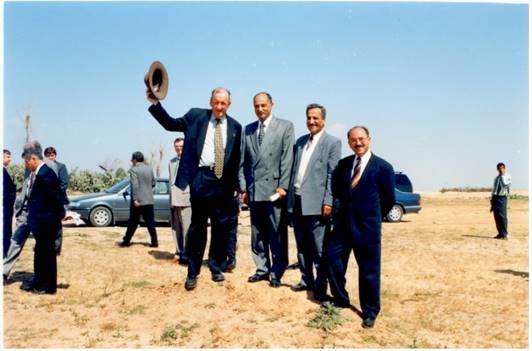
Tim Fischer belongs to a unique generation of Australian political leaders we are farewelling fast, including Gough Whitlam, Malcolm Fraser and Bob Hawke. Whether you agreed with their ideology or not, you could not but respect them.
I was in regular contact with Tim in my role as the representative of Palestine and the Palestine Liberation Organization in Australia. One day in February 1997, I was sitting in my office when Tim rang me and asked me to come over to see him. My office was within walking distance of the federal parliament. He told me he was going to Israel and Palestine and asked if I could arrange for him to meet President Yasser Arafat. At the time Tim was leader of the National Party and deputy prime minister.
I welcomed his visit and reminded him of the fact that, although Arafat had been invited and visited all corners of the world—including the United States, Sweden, England, France, Germany, the Soviet Union, China and Japan—Australia was one of the few countries that had not yet invited him, and it would be timely and nice for him to carry such an invitation. He said, ‘Leave it with me.’
He indeed got the approval of the cabinet to invite Arafat, and during their meeting in Arafat’s office in Bethlehem he extended the invitation on behalf of the Australian government. Arafat accepted, thanked Tim and the Australian government, and said, ‘We will find a mutually suitable time in the future for a visit.’
During the meeting, Tim whispered in my ear that he would like to visit the Church of the Nativity. It was night-time and the church doors had already been closed. I informed Arafat of Tim’s wish, so he asked his protocol official to contact the church and ask them to do him a favour by allowing his visitor to see the church. Arafat had excellent relations with the church leaders in Palestine and they held him in high regard also.
When we arrived at the Church of the Nativity, priests from all different denominations were at the door waiting to welcome Tim. They gave him a tour of the church and took him down a flight of steps to the Grotto of the Nativity, the cave underneath the church where Jesus was born. Tim knelt, prayed and kissed the silver star in the floor that marks the spot where Jesus is believed to have been born. He was very emotional and immensely appreciative of being able to visit the church.
During his visit he also inaugurated, together with the Palestinian minister of justice, Freih Abu Middain, the court in Gaza that the Australian government had contributed towards the cost of building. He later met with officials from the Ministry of Education to inspect the land allocated by the Palestinian government for a technical school, which Bob Hawke was hoping to raise $5 million from the Australian government to establish.
Three months later, following a meeting between an Israeli lobby delegation and then prime minister John Howard in his Sydney office and a private lunch with another Israeli lobby group with then foreign minister Alexander Downer in Melbourne in the same week, I was informed by the Department of Foreign Affairs on 23 June 1997 that they had been instructed by the minister that ‘Arafat’s visit is not appropriate’, although we had not yet discussed a time for the visit and it was not even on Arafat’s busy itinerary at the time.
A controversy erupted. This decision put Tim and the Australian government in an embarrassing position and was widely condemned by the opposition and nearly all major Australian media outlets.
Nevertheless, when John Howard visited Palestine and met with Arafat on 1 May 2000, he again officially invited him to visit Australia.
Tim was highly critical of Israel’s occupation, violations and aggression against its Arab neighbours. The Australian newspaper reported him on 21 July 1993 saying, ‘It is high time the West took off its rose-tinted glasses and examined the actions of Israel in detail.’ And the next day it reported him saying, ‘It’s time we got back to the facts of the situation and examined all the facts associated with the complex issue of the Middle East.’ He told the Australian media on 2 August 1993, ‘It is a pity we don’t have a more wide-ranging debate in Australia on the Middle East. There is an extremely well-organised Jewish lobby in Australia which is better organised than the Arab lobby, and this is part of the equation influencing debate on the Middle East.’
During one of our meetings, he asked, in astonishment, regarding Israel’s prohibition of the export of Gaza’s products to Europe, ‘How does the export of Gaza’s cut flowers threaten Israel’s security?’
Tim was indeed a man of courage and a fair-dinkum Australian.

